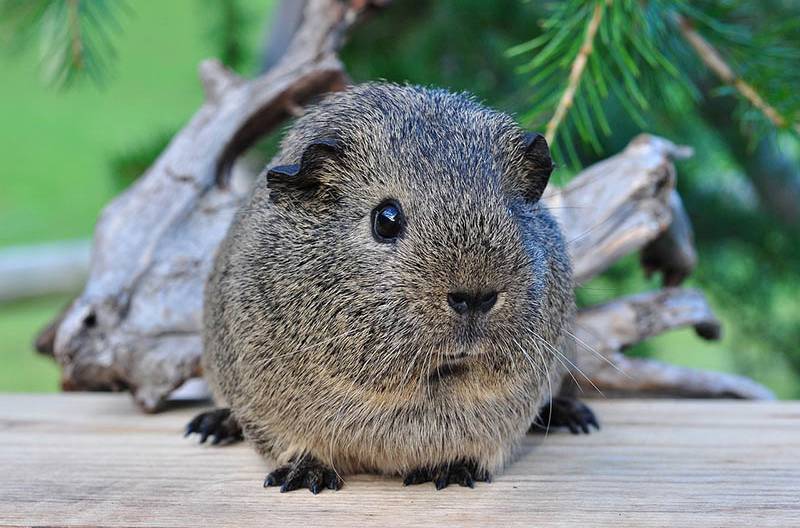How Do Guinea Pigs See? Vet-Reviewed Vision Facts & FAQs

Updated on

Click to Skip Ahead
Guinea pigs are popular pets, known for their adorable looks and friendly behavior. But have you ever wondered how these small creatures see the world around them? To understand how a guinea pig sees, you must learn about their anatomy and what affects their vision. Having a better understanding about their vision can help us better cater to their needs and enhance their living environments.
Anatomy of a Guinea Pig’s Eye
Size and Shape
The eyes of guinea pigs are quite large compared to their overall body size, lending them a distinctive appearance. These round, protruding eyes play an essential role in their ability to scan their environment.
Color Perception
Contrary to popular belief, guinea pigs are not colorblind. They can discern different colors, but their color perception is not as rich or nuanced as ours. They are considered dichromatic. Research indicates that they likely see colors similarly to a human with red-green color blindness, meaning they can distinguish between some colors but may confuse others.
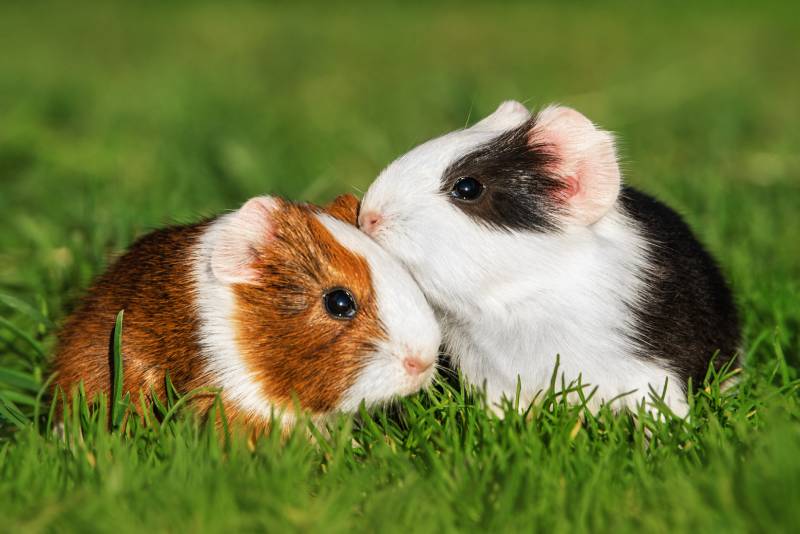
Degree of Vision
The eyes of a guinea pig are located on the sides of their head, a typical trait of prey species in the animal kingdom. This placement provides them with a wide field of vision without needing to move their heads significantly. Their visual field is estimated to be around 340 degrees. It enhances their ability to detect sudden movements, helping them spot potential predators quickly.
Field of Vision and Light Sensitivity
Wide Peripheral Vision
Due to their side-eye placement, guinea pigs possess a wide field of peripheral vision. This broad scope allows them to survey a large part of their surroundings simultaneously. It’s a vital survival mechanism that helps them stay alert to any potential threats lurking around them.
Blind Spot
One of the limitations of having such a wide scope of vision is that guinea pigs have a blind spot directly in front of their noses. This limitation often leads guinea pigs to rely heavily on their keen sense of smell to explore objects or food up close. They may sniff and nuzzle items to gain a better understanding of what lies in front of them.
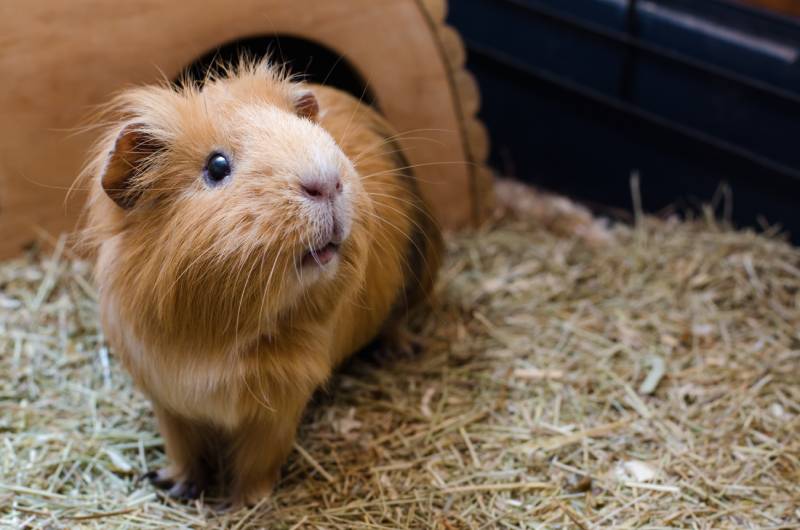
Depth Perception
Depth perception is influenced by the position of a guinea pig’s eyes. Due to their eyes being placed laterally, guinea pigs have a greater degree of monocular vision and a smaller binocular area, which influences their depth perception. Instead of relying solely on vision, guinea pigs use a combination of motion detection, touch, and auditory cues to navigate their environment effectively.
Night Vision
As crepuscular creatures, guinea pigs are most active during the twilight hours of dawn and dusk. During these times, the light levels are low, which suits the nature of their eyes. Although guinea pigs do not have perfect night vision, they can navigate well at night. This advantage allows them to find food and evade predators even when light conditions are poor. However, they still require some light to see and should not be kept in complete darkness.
 Common Eye Conditions
Common Eye Conditions
Conjunctival and Corneal Foreign Bodies
It is very common in guinea pigs to suffer from foreign bodies inside their eyes. These are usually plant material from bedding or feeding (hay, wood shavings, grass). Foreign material can cause irritation, infections, and corneal wounds. It is vital to take your guinea pig to the vet if you notice excessive blinking, eye discharge, redness, or any signs of eye discomfort. The consequences of an untreated foreign body can be very serious.
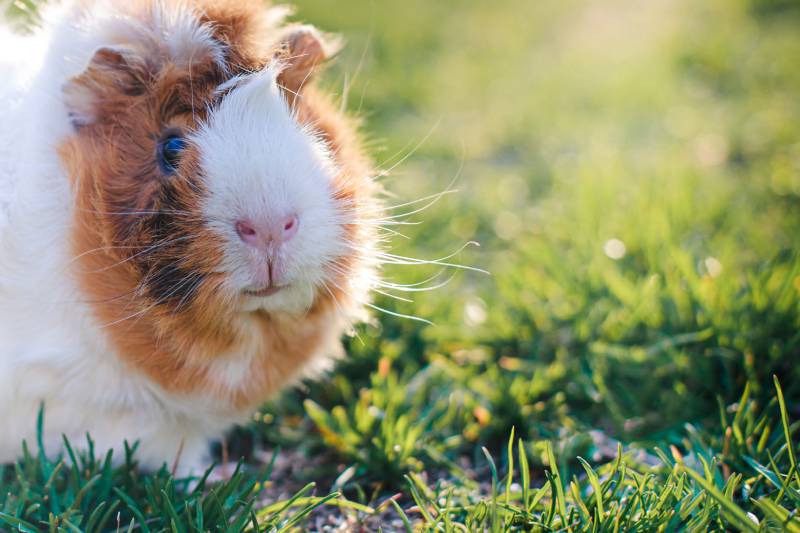
Eye Infections
Guinea pigs can suffer from various eye infections that might affect their vision. These can be caused by bacteria, especially species of Pasteurella, Streptococcus, or Chlamydia psittaci. Signs can range from redness and swelling to discharge or excessive tearing. Your guinea pig might also frequently squint or keep their eyes closed, indicating discomfort. Regular check-ups can help detect these issues early, and a vet can prescribe appropriate treatment, which might include eye drops or ointments. Always ensure your guinea pig’s living area is clean and safe to help prevent such infections.
As guinea pigs get older, they might experience some degree of vision loss, though this hasn’t been fully described. Some older guinea pigs might have difficulty seeing objects at a distance or struggle with depth perception. If you notice any vision loss, make sure you contact your vet right away. To help manage vision loss, maintain a consistent layout in their cage to avoid confusing your pet. The vet can monitor your pet’s vision changes and provide guidance on how to make your guinea pig more comfortable as they navigate through their golden years.
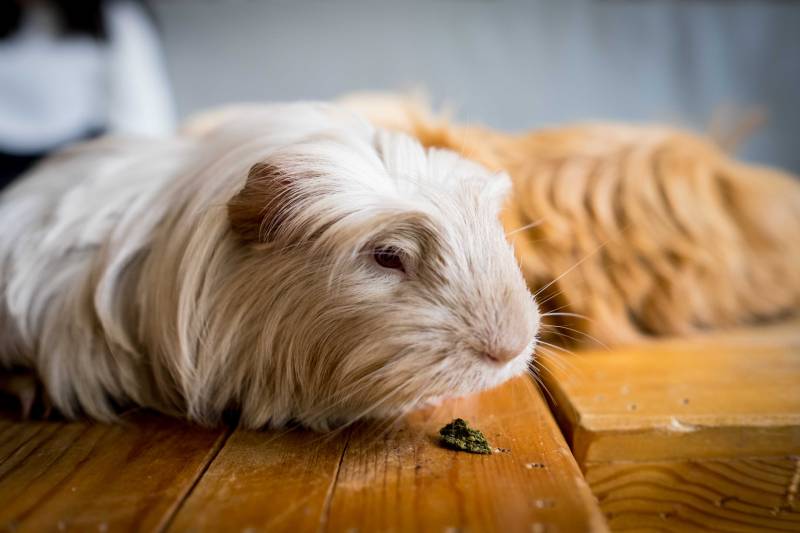
Conjunctivitis (Pink Eye)
Pink eye is a common condition in guinea pigs. Conjunctivitis can be caused by infections or by Vitamin C deficiency. It is also common to notice a flaky discharge on the eyelids. Treatment is directed at correcting the dietary deficiency.
Vision Compared to Similar Pets
When comparing the vision of guinea pigs to other similar pets, there are some distinct differences and similarities.
Hamsters
Hamsters, especially those that are nocturnal, such as the Syrian golden hamster, probably have better night vision than guinea pigs. However, they don’t see a wide range of colors and primarily rely on their sense of smell and touch.
Rabbits
Like guinea pigs, rabbits have their eyes positioned on the sides of their heads and also high up, allowing for a wide field of vision and detection of predators from almost any direction.
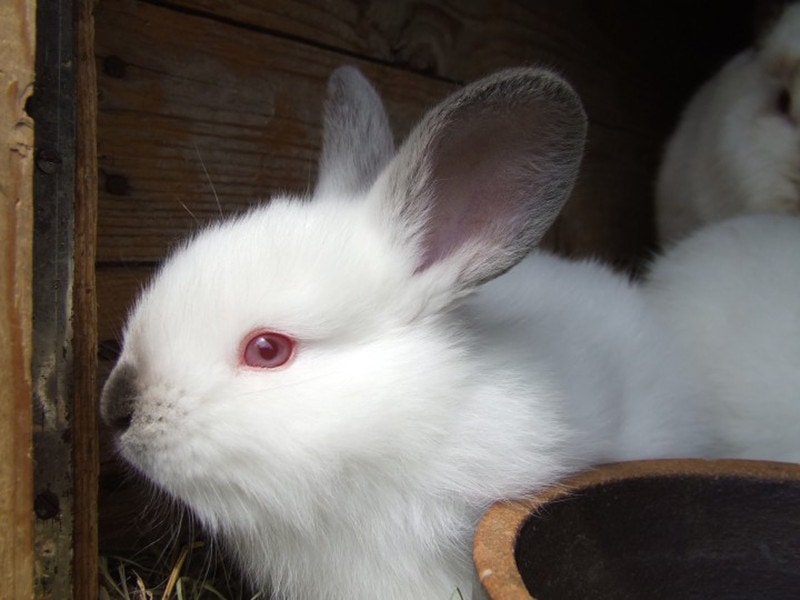
Chinchillas
Like guinea pigs, chinchillas are crepuscular. They also have a wide field of vision, but their color perception is not as well-studied as that of guinea pigs.
Ferrets
Ferrets also have laterally-placed eyes with limited binocular vision. Unlike guinea pigs, their pupil is a horizontal slit rather than round.

Other FAQs About Guinea Pig Vision
Q: How can I protect my guinea pig’s eyes from injuries?
A: You can protect your guinea pig’s eyes by keeping their cage clean and tidy. Inspect their eyes several times a day to ensure they look open and comfortable. Avoid dust, place their cage away from direct sunlight, and using dim lighting in their living area.
Q: Do guinea pigs rely solely on their vision?
A: No, guinea pigs also use their whiskers, sense of smell, hearing, and touch to navigate their environment.
Q: Do guinea pigs need regular eye check-ups?
A: Yes, regular eye check-ups can help detect and treat any potential eye problems early.

Q: Can guinea pigs see their owners?
A: Yes, guinea pigs can see their owners. However, they probably rely more on their sense of smell and hearing to recognize them.
Q: Can guinea pigs lose their vision as they age?
A: It is unclear how exactly guinea pigs’ sight deteriorates with time.
Q: Can guinea pigs’ eye conditions be treated?
A: Of course! Your vet can diagnose and treat many eye problems in guinea pigs. You need to stay vigilant, schedule regular vet check-ups and provide a healthy diet for your guinea pig to maintain their eye health.
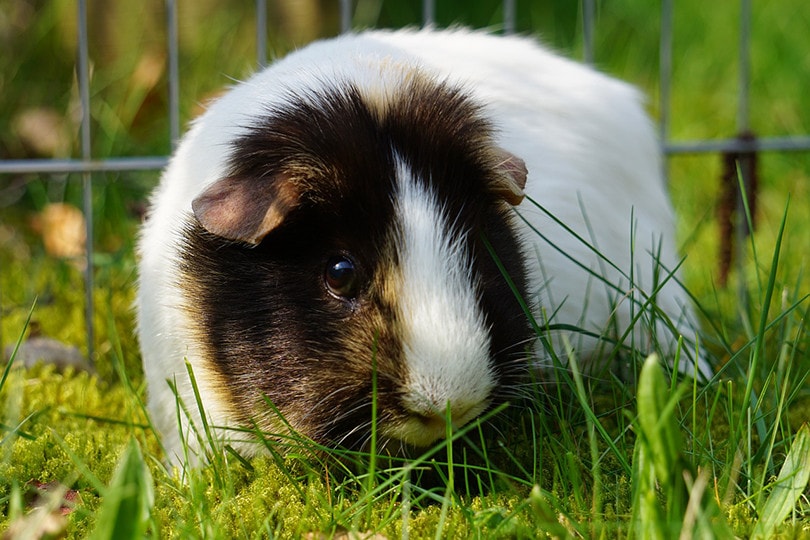
Q: Do guinea pigs blink?
A: Yes, guinea pigs do blink, but not as frequently as humans. They often keep their eyes open to stay alert for predators. Interestingly, their eyelids are open from birth unlike dogs and cats.
Q: How far can guinea pigs see?
A: It’s unclear how far guinea pigs can see, but they can detect movement from a good distance away.
Conclusion
Understanding a guinea pig’s vision can help us provide better care for these delightful creatures. With their unique visual abilities, guinea pigs experience the world differently than we do. Hopefully, now you’re a guinea pig vision expert. The only thing we haven’t covered is if guinea pigs think we’re cute! Maybe that’s why they popcorn! Regardless, always make sure to monitor your guinea pig’s eyes for any signs of distress. Early detection is key in preserving their vision and allowing them to look at cute things for their whole long lives!
Featured Image Credit: Rita_Kochmarjova, Shutterstock




